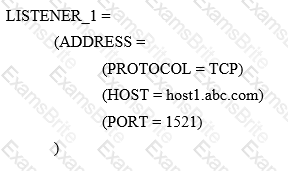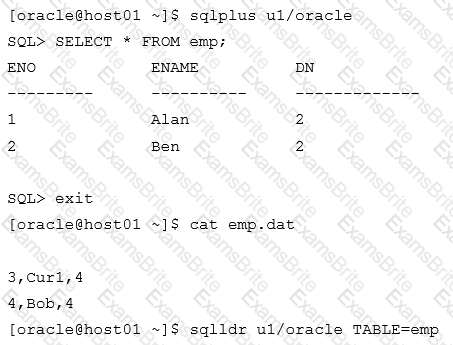Oracle Database Administration I
Last Update Apr 18, 2024
Total Questions : 142
We are offering FREE 1z0-082 Oracle exam questions. All you do is to just go and sign up. Give your details, prepare 1z0-082 free exam questions and then go for complete pool of Oracle Database Administration I test questions that will help you more.



Which two are true about a SQL statement using SET operators such as UNION? (Choose two.)
In the spfile of a single instance database, LOCAL_LISTENER is set to LISTENER_1.
The TNSNAMES.ORA file in $ORACLE_HOME/network/admin in the database home contains:

Which statement is true?
Which two statements are true about space-saving features in an Oracle Database? (Choose two.)
Examine this SQL statement:
SELECT cust_id, cust_last_name “Last Name”
FROM customers
WHERE country_id = 10
UNION
SELECT cust_id CUST_NO, cust_last_name
FROM customers
WHERE country_id = 30
Identify three ORDER BY clauses, any one of which can complete the query successfully. (Choose three.)
Which two statements are true about the configuration and use of UNDO_RETENTION with GURANTEED RETENTION? (Choose two.)
Examine these commands:

Which two statements are true about the sqlldr execution? (Choose two.)
You want to apply the principle of Least Privilege in all your live databases.
One of your requirements is to revoke unnecessary privileges from all users who have them using Privilege Analysis.
Which three types of analyses can be done using the DBMS_PRIVILEGE_CAPTURE package? (Choose three.)
Which two statements are true about the PMON background process? (Choose two.)
Which three files are used by conventional path SQL*Loader when the TABLE option is not specified? (Choose three.)
Which two statements are true about Enterprise Manager Database Express? (Choose two.)
The INVOICE table has a QTY_SOLD column of data type NUMBER and an INVOICE_DATE column of data type DATE.
NLS_DATE_FORMAT is set to DD-MON-RR.
Which two are true about data type conversions involving these columns in query expressions? (Choose two.)
Examine the description of the CUSTOMERS table:

You want to display details of all customers who reside in cities starting with the letter D followed by at least two characters.
Which query can be used?